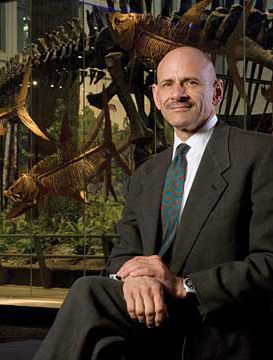|
 Charles Darwin is perhaps the single most important figure in the history of biology, having elucidated the way that species evolve through the process of natural selection. Darwin’s significance today, as a symbol of intellectual achievement and the triumph of scientific methods, radiates beyond the discipline of biology. Charles Darwin is perhaps the single most important figure in the history of biology, having elucidated the way that species evolve through the process of natural selection. Darwin’s significance today, as a symbol of intellectual achievement and the triumph of scientific methods, radiates beyond the discipline of biology.
To biologists, Darwin is the ultimate naturalist role model. His towering theory of natural selection grew out of his years of patient and meticulous observations of plants and animals in habitats around the world. Comparing living communities in very different environments, he found similar but distinct patterns of adaptation to environmental factors. Knowing that the characteristics of domesticated animals could be easily manipulated through selective breeding, he figured that just as humans produce different breeds of domestic pigeons by selecting the offspring that best displayed a desired trait (say, big fluffy blue feathers), so too nature generated diversity of species through a process of selection favoring traits that were beneficial to survival.
Indeed, whether by the hand of man or by the forces of nature, differential selection or differential survival of offspring will result in change over time for any organism. The singular unity of how evolution works is the great power of Darwin’s theory, and perhaps it is also why Darwin represents such a great threat to belief systems built on immutable views of creation. If evolution really is biology’s unified field theory, if it really can account for how everything we see got to be that way, then can there be any room left for other explanations?
Because of the omnipotent power of evolutionary theory, Darwin has also become a potent symbol of truth and reality in modern intellectual thought. This symbolic Darwin inspires truth seekers in all realms, including philosophers, physicians, educators, and, yes, those who work in museums.
For several decades, adult Americans have consistently ranked museums at the top of all public institutions for presenting unbiased, truthful information. I would like to believe that this reflects a fundamental belief in the power of science to lead to truth. Could it be that these survey respondents also perceive that museum workers adhere to the same principles of scientific rigor that guided Darwin to his understanding of how evolution works?
In a 1941 editorial for Natural History Magazine, Margaret Mead perfectly described the enduring value of science and the enduring need for museums:
"Those who enter the doors of our museums do so in a faith that they will not be tricked or deceived, that no one will seek by high-powered lighting arrangements to make the facts of science other than they are. They go out from the doors of the museum believing in one of the foundations of democracy—that it is possible for an individual by slow, honest, exact study to find out more about man and the world in which he lives. For an hour or so they have been able to trust their eyes and let their minds rove over materials which have not been arranged to impress, to convert, to push them around, but merely to tell them as much of the truth as is now known, and that quietly.
So at this moment, when America needs the strong, deep enthusiasm of every citizen for the democratic way of life, the museum, which has refused to give up its faith in the materials of science, the museum, which has scorned to substitute emotional appeals for orderly demonstration, finds itself with a definite place in the national program. As a place that the people trust, it is now a place in which they can renew their trust in science and in democracy."
Here are some very heady concepts linked together: scientific observation, truth, museums, trust, democracy, and a national enthusiasm for all of these. I would like to think that there is a Darwinian fitness to this mix that will ensure a central societal role for museums for a very long time—even as society itself evolves—ensuring that in the halls of museums, the next generation, perhaps with its own Darwin, will find a place to observe, wonder, and be inspired by the truth of nature.

Samuel McElroy Taylor, Director
Carnegie Museum of Natural History
|
 Winter 2008
Winter 2008

 Charles Darwin is perhaps the single most important figure in the history of biology, having elucidated the way that species evolve through the process of natural selection. Darwin’s significance today, as a symbol of intellectual achievement and the triumph of scientific methods, radiates beyond the discipline of biology.
Charles Darwin is perhaps the single most important figure in the history of biology, having elucidated the way that species evolve through the process of natural selection. Darwin’s significance today, as a symbol of intellectual achievement and the triumph of scientific methods, radiates beyond the discipline of biology. 